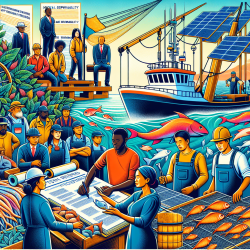Introduction
As a Special Education Director, I often find parallels between the challenges in education and those in other sectors, such as the seafood industry. A recent research article titled The role of human rights in implementing socially responsible seafood sheds light on the critical intersection of human rights and sustainable seafood practices. This blog explores how practitioners in the seafood industry can enhance their skills by implementing the research outcomes and encourages further exploration into this vital topic.
The Human Rights Framework
The research highlights the significant gap in the seafood industry's sustainability efforts, which have traditionally focused on environmental performance while neglecting the welfare of fisheries workers. Human rights violations, including slavery and human trafficking, are prevalent in fisheries worldwide. These violations underscore the need for certification bodies and other seafood supply chain actors to improve social performance alongside environmental challenges.
Opportunities and Challenges
The research identifies several opportunities and challenges in implementing socially responsible seafood through human rights, legal, and policy instruments. While human rights laws are generally designed to address violations of civil and political rights, there is considerable scope for applying economic, social, and cultural (ESC) rights in this context. However, challenges such as weakly defined ESC rights infringements and a lack of straightforward mechanisms to enforce human rights entitlements persist.
Practical Steps for Practitioners
Practitioners in the seafood industry can take several practical steps to align their operations with human rights principles:
- Adopt Comprehensive Standards: Integrate social responsibility standards into existing environmental certifications to ensure a holistic approach to sustainability.
- Enhance Transparency: Utilize new technologies to improve transparency and accountability in the seafood supply chain, providing mechanisms for increased worker protection and voice.
- Engage in Policy Advocacy: Collaborate with governments and non-profit organizations to advocate for policies that support human rights and social responsibility in the seafood sector.
- Invest in Training and Education: Provide training for workers and stakeholders on human rights and socially responsible practices to foster a culture of respect and dignity.
Conclusion
The integration of human rights into socially responsible seafood practices is not only a moral imperative but also a strategic advantage for the industry. By embracing these principles, seafood companies can enhance their reputation, meet consumer demands for ethical products, and contribute to the global movement towards sustainable and equitable food systems.
To read the original research paper, please follow this link: The role of human rights in implementing socially responsible seafood.










